What is Badger DAO (BADGER)?
Badger DAO is a decentralized autonomous organization (DAO) that focuses on bringing Bitcoin (BTC) to Decentralized Finance (DeFi). The project aims to solve the challenge of using Bitcoin as collateral in DeFi applications by developing innovative tools and protocols that allow for the integration of Bitcoin into the broader DeFi ecosystem, which has predominantly been built around Ethereum and other smart contract platforms.
The BADGER token is the governance token of Badger DAO, allowing holders to propose and vote on key decisions affecting the platform’s development and operations. It also plays a role in the distribution of rewards within the ecosystem, specifically to those who participate in managing Badger’s products like Sett Vaults and DIGG.
How Does Badger DAO Work?
Badger DAO operates primarily through its governance structure, where BADGER token holders can participate in the decision-making process. Here’s a breakdown of how it works:
- DAO Governance:
- BADGER token holders can vote on protocol upgrades, product changes, and other important decisions within the ecosystem.
- The more BADGER tokens a user holds, the more voting power they have.
- Proposals with sufficient votes from the community are implemented on the platform.
- Bitcoin in DeFi:
- Badger DAO integrates various DeFi products to make Bitcoin usable across different blockchains.
- By allowing Bitcoin to be used as collateral, Badger DAO bridges the gap between the traditional crypto world (Bitcoin) and the emerging decentralized finance ecosystem.
- Partnerships:
- The project collaborates with other DeFi protocols like Yearn Finance, Ren, and Curve Finance to help integrate and bring more utility to Bitcoin in DeFi.
Key Products of Badger DAO
- SETTs (Sett Vaults):
- SETTs are automated yield farming pools where users can deposit tokenized Bitcoin (like wBTC or renBTC) and earn yield on their assets.
- When users deposit their Bitcoin or tokenized Bitcoin into a SETT, they receive bTokens in return (e.g., bBTC for Bitcoin deposits).
- These bTokens represent the user’s share in the SETT and accrue yield over time, which is paid out in Badger or other tokens, depending on the specific SETT.
- The key benefit of SETTs is that they automate the yield optimization process, making it easier for users to earn passive income on their Bitcoin without needing to manually interact with complex DeFi protocols.
- DIGG:
- DIGG is an elastic-supply cryptocurrency pegged to the price of Bitcoin.
- The unique feature of DIGG is that its supply is not fixed, but instead, it is adjusted programmatically in response to fluctuations in the price of Bitcoin. This process is known as rebasing.
- If Bitcoin’s price rises, the supply of DIGG expands to bring its price back in line with Bitcoin.
- If Bitcoin’s price falls, the supply of DIGG contracts to prevent its price from dropping too much.
- This elastic-supply mechanism ensures that DIGG remains pegged to Bitcoin’s price over time, but without the issues of traditional fixed-supply tokens.
- DIGG can also be deposited into SETTs to generate yield, just like other assets.
What Are the Potential Use Cases for Badger DAO?
Badger DAO has several potential use cases, particularly in the realm of DeFi:
- Using Bitcoin in DeFi:
- By offering Bitcoin (or tokenized Bitcoin) as collateral for DeFi applications, Badger allows Bitcoin holders to leverage their assets in decentralized lending, borrowing, and yield farming.
- Yield Generation:
- Through SETTs, Bitcoin holders can generate passive income from their assets by simply depositing them into automated vaults that optimize yield farming strategies.
- Decentralized Governance:
- The BADGER token allows holders to participate in the governance of the ecosystem, influencing the development of the platform and decision-making regarding new products, updates, and integrations.
- Elastic Supply Currency (DIGG):
- DIGG offers an innovative way to create a cryptocurrency that tracks Bitcoin’s price while automatically adjusting supply, opening new possibilities for DeFi applications that require a stable, Bitcoin-pegged asset.
- Cross-Chain DeFi Integration:
- Badger DAO’s tools help bring Bitcoin into the growing multi-chain DeFi ecosystem, allowing Bitcoin to be used seamlessly across Ethereum, Polkadot, and other blockchain networks.
Who Created Badger DAO?
Badger DAO was founded in September 2020 by four key individuals:
- Chris Spadafora – One of the co-founders, known for his work in crypto and for organizing the Crypto COVID-19 Charity Poker Tournament.
- Ameer Rosic – A serial entrepreneur and co-founder of Blockgeeks.com.
- Albert Castellana – Co-founder of StakeHound.
- Alberto Cevallos – Advisor to the project.
Badger DAO worked with dOrg, a company specializing in building decentralized autonomous organization (DAO) infrastructure, to develop its DAO governance model.
What Makes Badger DAO Unique?
- Bitcoin-Backed DeFi: The core innovation behind Badger DAO is enabling Bitcoin to be used as collateral within the DeFi ecosystem, which had previously been dominated by Ethereum-based assets.
- Elastic Supply (DIGG): The introduction of DIGG, an elastic-supply token pegged to Bitcoin’s price, represents an innovative way to create Bitcoin-linked tokens that don’t require a fixed supply, but rather adjust automatically based on market conditions.
- Automation with SETTs: SETTs provide users with an easy and automated way to earn yield on their Bitcoin (or tokenized BTC) holdings, without requiring manual intervention.
- DAO Governance: As a DAO, Badger provides a decentralized way for its community to control and influence the future development of the project, making it more community-driven and transparent.
What is the History of Badger DAO?
Badger DAO was officially launched in September 2020 with the goal of making Bitcoin usable in the DeFi ecosystem. Since its inception, Badger has grown rapidly as Bitcoin adoption in DeFi has increased, allowing users to stake and farm yield using tokenized Bitcoin.
Over time, Badger introduced SETTs as its primary product for yield farming and DIGG as a Bitcoin-pegged elastic-supply token. Badger DAO’s BADGER token became the governance token for the platform, enabling community participation in the future of the project.


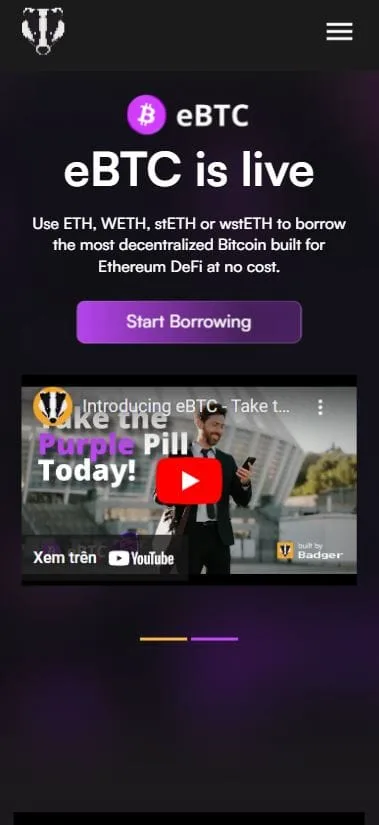
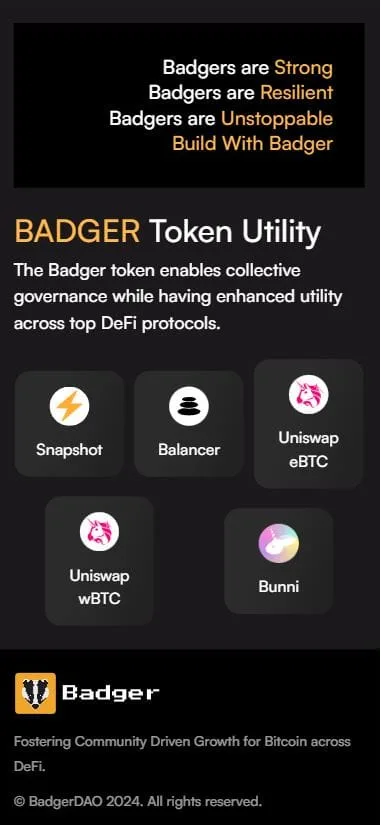







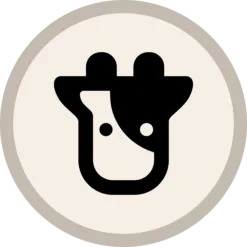
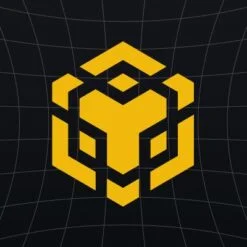
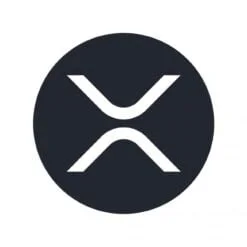




Anthonywax –
News on crypto exchanges
Anthonywax –
Cryptocurrency security updates
nguyenbathanh007 –
Tuyệt vời
Eyad –
good
Harran –
The logo is not good